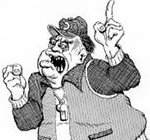They may be invisible and their art unsung. But in the age of blogging, editors are needed more than ever.
By Gary Kamiya from Salon Jul. 24, 2007
I've wanted to write about editors and editing for years, but since I was one of that invisible tribe myself until a year ago, it felt unseemly. But now that I have switched full time to the other side of the desk, I can gush without stint. [That's what you think, bub -- Ed.]
To people not in the business, editing is a mysterious thing. (Actually, it's mysterious to most bloggers, who despite having been in existence for less than 10 years, probably outnumber every writer who ever wrote. But more on them later.)
Many times over the past 20 years, people have asked me, "What exactly does an editor do?" It's not an easy question to answer. Editors are craftsmen, ghosts, psychiatrists, bullies, sparring partners, experts, enablers, ignoramuses, translators, writers, goalies, friends, foremen, wimps, ditch diggers, mind readers, coaches, bomb throwers, muses and spittoons -- sometimes all while working on the same piece.
Early in my editing career I was startled when, after we had finished an edit, a crusty, hard-bitten culture writer, a woman at least twice my age, told me, "That was great -- better than sex!" I make no such exalted claims, but there's no doubt the editing process can be an intimate and gratifying experience for both parties. Although, to pursue our somewhat dubious metaphor, there are also times when writer and editor, instead of lying back and enjoying a soothing post-fact-check cigarette, stare emptily at the ceiling and vow never to share verb tenses with anyone again.
When an editor's lucky, the piece comes in chiseled in immortal Carrara marble, every semicolon in place, ready to be wheeled into the Uffizi Gallery -- that is, straight to publication. (A very rare event.) A good editor knows when to leave a piece alone. Practically every writer has had the unfortunate experience of crossing paths with editors -- often inexperienced ones -- who feel the need to do something, just to show they're doing their job.
This is almost as frustrating as the too-many-editors problem, in which a piece bounces from a senior editor to the managing editor to the executive editor, each of whom gives contradictory instructions, and finally ends up in the hands of the editor in chief, who after Olympian reflection pronounces that it was better the way it was when it started. It is experiences like these that lead writers to engage in one of their favorite pastimes: bitching and moaning about the lameness of editors.
Friday, September 14, 2007
Subscribe to:
Post Comments (Atom)







No comments:
Post a Comment